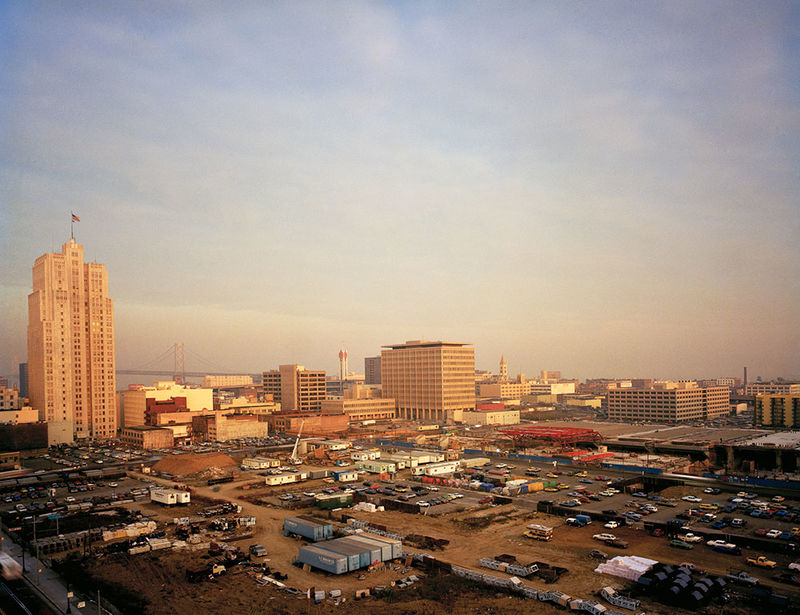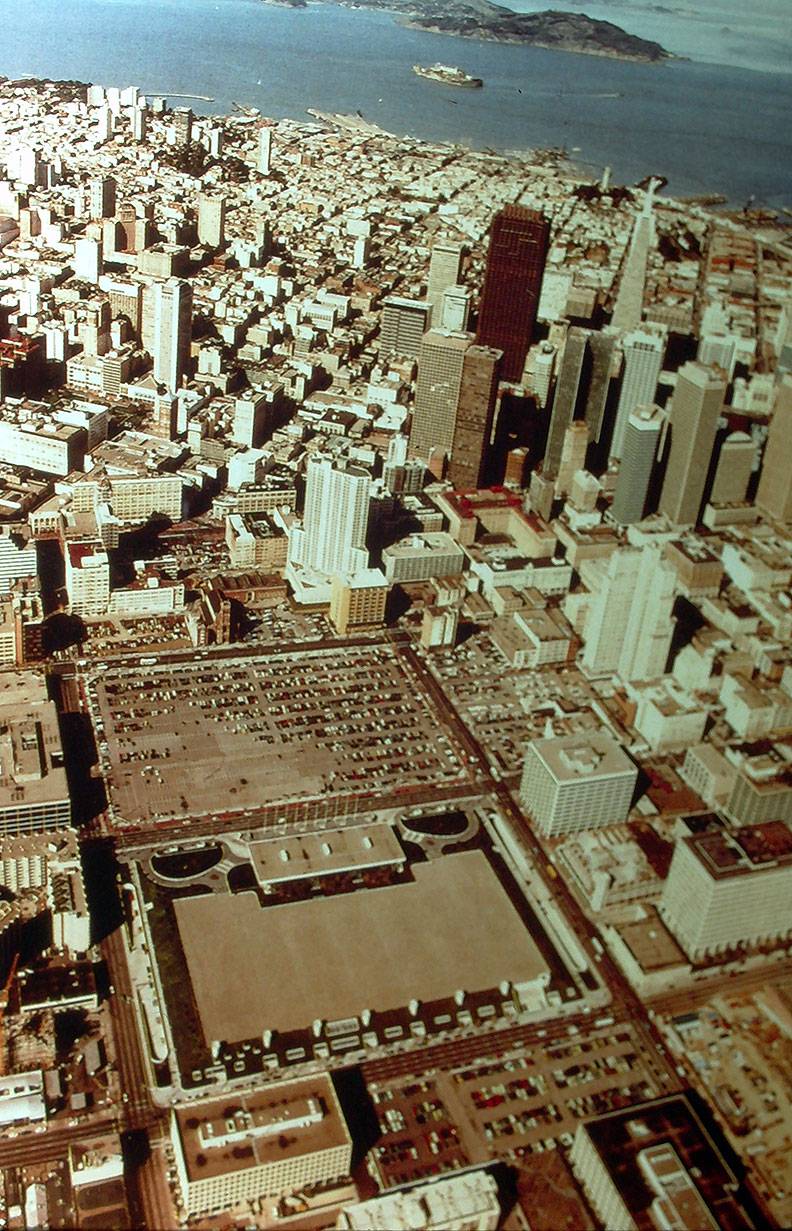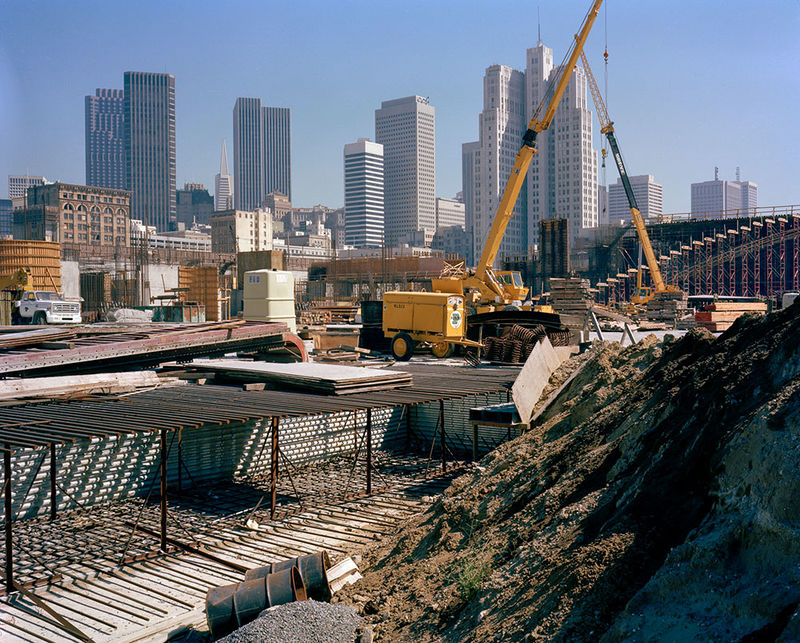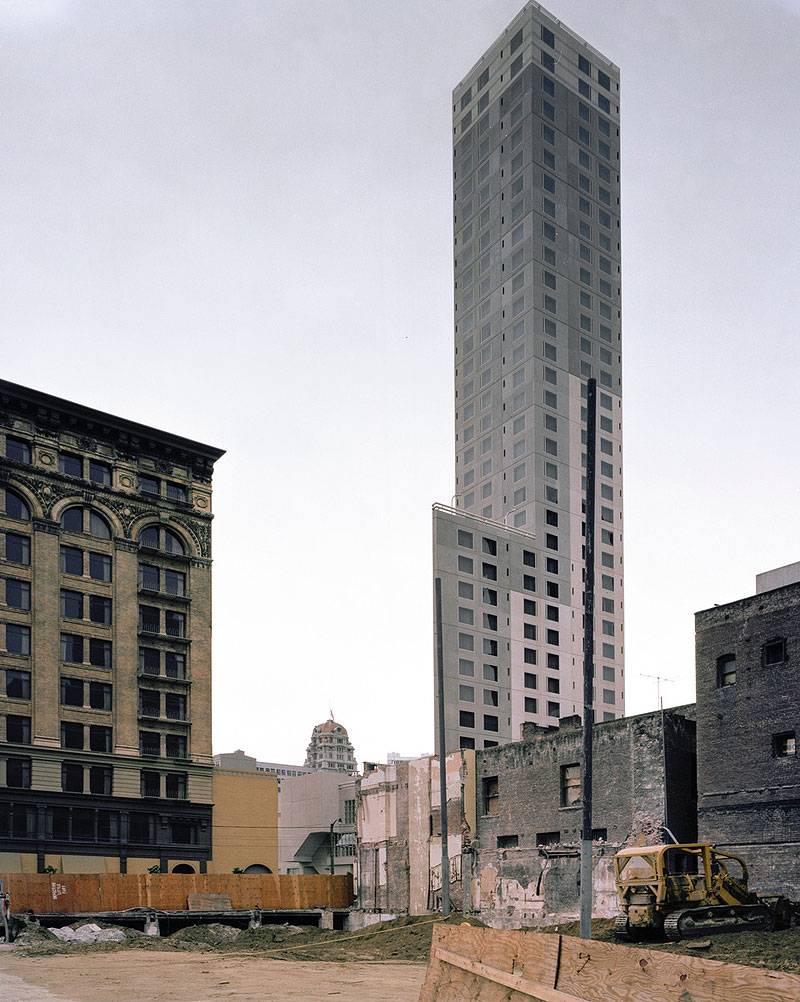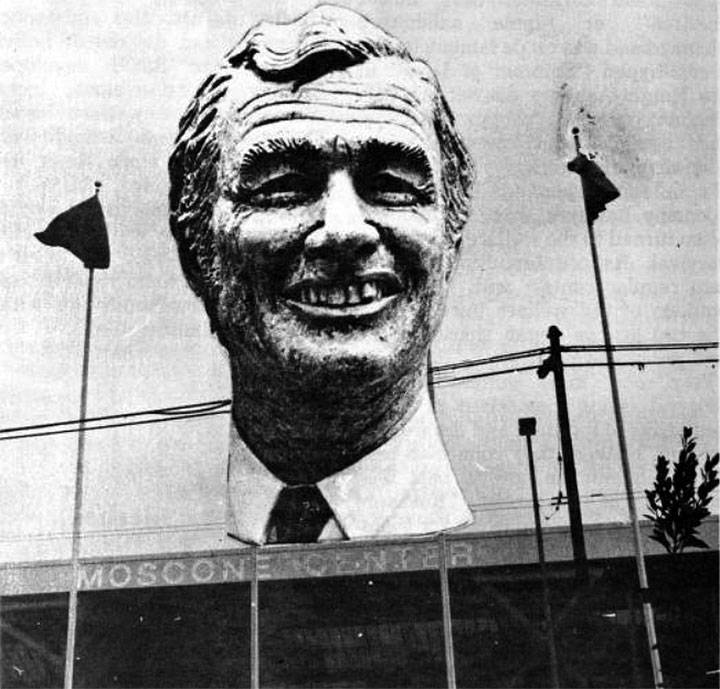The Moscone Center Job 1980
I was there . . .
by Eric Johnson
The Moscone Convention Center Project Area in 1981.
Photo: © Janet Delaney
I was born in San Francisco, but there are neighborhoods and subcultures that are nearly foreign lands to me. Work life is like that. You can live knowingly in a town, yet until you are hired at the mayonnaise factory, you have no idea of that far-flung land. Every job is a world, a land with its language & customs, its ‘foreignness’. I worked many years in construction, yet every new job I hired onto was like Ellis Island at first. When the union sent me down to the Moscone Center in 1980, all I knew was that hundreds of our members had worked there and that it was huge. When I got to the office and they told me where to meet up with my foreman, that was familiar. The boss’ manner, the trailer-office, the exterior of the site with scaffolds and guys in overalls carrying lumber or toolboxes. But then I found the huge ladder to the interior, and descended into a gloom with profound echoes and slanting rays of sunlight.
Under the vaulted roof was a city block of unfinished basement. A rough concrete floor the size of six football fields, with workers swarming all over the edges where walls were going up, stairways getting formed, roof beams anchored. Smell of exhaust from the concrete trucks, generators and forklifts. Noise from them and a hundred other sources. Clangs, whumps, ratatats, metallic screams. From the ladder I felt like Hieronymous Bosch staring out at the lower depths. Everyone down there was condemned for some sin. Struggling in an acrid eternity with steel and concrete and timbers, while demons paced and barked at them. This was my fate, the union dispatch slip a lottery karma.
First I had to find the General Foreman, the chief of carpenters…& was told he was a large black fellow name of Buddha. Buddha seemed easy-going but more like a street hustler than a carpenter. It was clear in that brief interview that ‘Buddha’ was given to him with a deep sense of irony. He was distracted with command duties and just told me to go to a section of wall and report to Benson Wong. Walking with my toolbox, now ankle deep in my fate, it was hard to suppress revulsion at the impact of the work scene. Not much carpentry going on here. Din, smoke, trucks, & trudging hard-hats. Benson Wong turned out to be a snappy Hong Kong construction man with a deep accent and sergeant’s manner. His younger brother Jackson worked in the crew of ten, along with a motley from the hall: old Irish guys, newly-visaed Irish, a young muslim black guy, an older black guy, a Maori named Max, and so on.
They teamed me with Max at first, and we were sent up a wall to plumb & line it and secure all braces. Ahhh. that’s familiar. I know this language. The forms have holes drilled at intervals, the snap-ties go through both inner & outer forms, through the whalers. The hair-pins go on the snap-ties, the double-head eights secure the hair-pins. Down lower we slide in the she-bolts, through the whalers, then cat-heads screwed on the she-bolts, then double-heads secure the cat-heads to the whalers. Sure, I can talk that talk. Crescent wrench & steel-handled hammer talk. Talk from a safety belt forty feet off the pavement, taking my pace from Max. Benson Wong staring up at us, occasionally barking out orders.
Max was a middle-aged warrior-caste fellow, veteran of Vietnam although having no sense of allegiance to the USA. He was New Zealand born, somehow recruited in Australia, and his father’s teaching was: if you have to fight—you fight hard. He spoke no regrets about jungle fighting. Not a good time of his life, but, oh well. But the booze habit, that started in Nam. Now he drinks gallons of beer after work, somehow righting himself every morning and doing this semi-military job. It was a good way to enter this subterranean land…with Max as escort.
One thing we had as common language was: hierarchy. How to survive morally & physically under a particular command structure. Max laid it out for me, how Jackson spied for his brother, how Buddha was indeed a gangster and had gotten his job by intimidating the union business agent. That the Irishmen were up to something, caucusing. That the company was disorganized and pushing everyone to produce results without real engineering depth. They kept fouling things up, getting ahead of themselves, doing shoddy work. He pointed over to the outside edge of the wall we were on. Down in the pit, maybe thirty feet below street level, men were spraying tar-like stuff on the new concrete walls. “See that? They’ve been skipping some areas when inspectors aren’t around. Then they just backfill; and you know, that means no waterproofing down there in places.”
A couple of days later we heard shouts from the exterior ditch, real panic yells mixed with the sounds of wood creaking and exploding. They had been pouring concrete down the exterior walls all morning and a section of the form-work burst open. By the time we got in position to see it, the bulge down at the base of the wall was huge, tons & tons of concrete had just slumped through the forms like lava, and broken all the braces. Men were scrambling to rig up a containment area, shoveling sand down, trying to put new braces in—but failing. Eventually someone in charge was shouting to give up on it, get the hell out of the way. The lava flow was spent and the upper wall-forms had held. Max felt they were not going to try to get the crushed forms out of the mass once it cured… and a few days later they simply backfilled over it.
Many years later, I read in the newspaper that the City had sued the contractors for a serious leak in the convention center basement. Could have been right there…there’s no way they could have properly sealed that area.
Aerial shot of the Yerba Buena Gardens project, with the Moscone Center completed on lower (southern) half of the property, c. 1983.
Photo: Tim Drescher
Sparrowhawk
I was next partnered with David Stillbasin, a young Native American of I forget which tribe. He introduced himself as a junkie on mandated rehab terms that had gotten him into the carpenter’s apprenticeship. He was supposed to be on methadone… but maybe still shooting up too. It was obvious at a glance how untrained he was. The awkward size of his toolbox, the lack of industry in his demeanor—for this most industrial of carpenter jobs.
David & I had been working on the south perimeter, forty feet up, hanging from safety belts to attach the next level of outer forms. The foreman constantly patrolled his sector yelling at anyone looking idle. David was a problem for me immediately. He moved like corn syrup and would stop often to muse over something. I knew he was on the Benson’s radar and that we weren’t getting enough done. Which meant I had to do more than my lot… and also motivate him, set him up with things he could do without confusion. It was stressful yet at the same time I longed to slip over into his dimension.
After a few days it seemed we understood each other better. And in that contact-high in which I picked up his opiated fumes and he caught a little of my athletic exhilaration grappling over the edge of the wall, we could talk about this very thing: the difference in mental space. About the Pressure of the System… could one resist it yet flow along inside its machinery? What it was like to be Native American in 1980 San Francisco, to be a junkie, to be a poet, to be bullied at work, to be always on the lookout for spaces where one could be High safely? While in fact hanging from rebar forty feet in the air?
For several days running we had that same assignment; we hung from our belts, working our way along the outside rim and talking while we did the repetitive bolting. One of those afternoons the sun was at our backs and we paused to appreciate that every thing we saw within the Great Hall seemed illumined and bizarre…the little humans rushing about, the machinery almost comical, Clifford smoking a joint behind a column, the grids & spires of rebar rising all along our rampart. Suddenly we felt a Disturbance in the sunbeams, a flashflutter…and then stillness…a signal, a presence? Then saw it: a hawk, perched in the rebar column very near us, shrugging its wings.
“Sparrow hawk.” said David.
We were frozen. Up close, one of the most beautiful of birds…regal orange, grey & black… proud piercing eyes. But more astonishing was the audacity of it, this seizing of anti-natural space.
What is it hunting here?
“It’s not hunting.” whispered David.
“It came to see us, it sensed the companionship.”
Ongoing construction of the Moscone Convention Center, 1980.
Photo: © Janet Delaney
Cordon Blue
The great roof beams were almost done and the perimeter walls were growing daily. The vast interior cave shuddered with concrete trucks, giant compressors, hundreds of power tools. Fractured beams of sunlight lit up the exhaust & dust at strange angles, and the steel and wood stagings formed huge sculptural backdrops and echo chambers.
One morning there was a tremendous fuss going on at the East end of the cavern. A hundred chairs were set up and a temporary stage brought in. By lunchtime, an area had been roped off and people in suits were filtering in down the road-ramp that came from street level. The past few days we had been taking our lunch where the sun had decided to show itself along the ramp. So we were walking right past the edge of the cordoned area, getting polite nods from the suits. One of them stepped towards us and introduced himself as one of the Union’s regional leaders. He was at pains to show he was representing us…still one of the workingmen. There’s never a moment when the career union people don't feel the tension in this breach. Once you move up into salaried leadership, you never have to work on a job again. You wear suits and confer with contractors and politicians…and the carpenters become your…clients. Jones handled it affably enough, and one of us knew him slightly, so he opened up a bit and told us what the gathering was about. It was a civic celebration of the progress in construction…the Moscone Center was apparently half-done. He said the Mayor would be here, and other regional pols, and they were going to thank all the people who made it possible. We said how about us?
Jones said, “Well sure, that’s why I’m here, and you know I’ll represent the great effort the Carpenters have put into this thing.”
Oh yeah, sure. And helluva thanks to you Jones. Then he went back behind the cordon.
We sat against the curving bulkhead along the ramp, basking in the sun and ogling the dignitaries—as they had no other way to get to the ceremony. All of them avoided eye contact as they walked through the gauntlet, until Mayor Dianne Feinstein arrived. She broke off from her escort and came right up to us and introduced herself. Said a couple of friendly niceties and then went into the cave. We were duly impressed. She was the only one who picked up on the theater of exclusion and irony spread out before them, and crossed it. It wasn’t as if she’d won our hearts…simply that she respected us when the disrespect was palpable.
At 12:30 we all headed back to work, pausing along the cordon. Now we felt it sharply. They had champagne! The mayor was toasting the construction company and the architects, and other City luminaries…while we ranged along the rope barrier waiting for …a tip of the hat? a glass of the bubbly?…. which never came. Five minutes later we were up in the scaffolds or down in the pit.
Pole-axed
One day Benson sent me to work with the three Irish carpenters. We were stripping forms behind a wall a long way from the main work of our crew. After a couple of hours work, Stanley, the oldest, brought up a Topic that clearly had juice to it. He had to stop work and look me in the eye because… this was about Race. He started with a recent controversy about affirmative action, made it clear he was disgusted with the idea, then said a few things about me. That I worked hard and was a good union man, he could see that…and a hint at something collusive.
“You see the problem don’t you ? I mean there’s some of us that try to do something about it.”
I was alert to the undertone and said something to keep him talking. He started in on the Black carpenters on the jobsite.
“Buddha, what a joke, he’s an animal. And this so-called Abdul in our crew, don't you see what affirmative action means?”
Abdul was an intense young carpenter with a red bandana as a sweat band and an edge of warning in his face.
Then he made a more direct overture: that I might be interested in meeting with them over in Pleasant Hill. Here I stopped him.
“I’m not with you on this Stanley. And I’m offended that you bring this kind of thinking to California where we’re trying to get past it.” He glared at me and the other two turned away, embarrassed. We worked the rest of the day in near silence, and I noticed that I was switched to another partner the next morning. Apparently Stanley had finagled that whole set-up.
I replayed everything Stanley had said. He was using phrases common to the neo-Klan groups in California, and there was no doubt that he was speaking as a commander of something. The other two men were recent immigrants who were dependent on Stanley, who had been in the US for more than a decade. There was an undertone of militancy in him, a glint of a dare in his eye. I realized that what I’d said had put me beyond the pale, a race traitor. They studiously avoided me in the weeks afterward, occasionally shooting glares my way.
One afternoon at quitting time, we all were gathered at the job-box pulling off overalls and getting our toolboxes in order for stowage. Stanley was muttering to his friends about tools being missing. He was agitating and suggesting with his eyebrows that Abdul was the problem. The biggest of his buddies made it a little more obvious, in some way that I missed, and suddenly Abdul picked up a guardrail pole and swung it over his head and down on Pat. It hit him full on the hardhat and knocked him flat to the ground. Everyone froze, even his friends. Time stopped for me too. It was so far out of our experience, and so lethal a blow. Abdul said something fierce to Pat who was starting to get up, like “racist motherfucker!” …and then we all woke up. I found that I had walked in a circle, spinning in disbelief and nausea. The worst was coming to pass. Abdul had manifested the true condition, that Stanley and his buddies were his enemies…and had declared war. This was what it all had come to, even San Francisco, the union town, was descending into fratricide. While the foreman and others got between the combatants, Abdul threw his gear in the box and strode off. Pat was seen to be unhurt…but of course Stanley made the most of it, agitating the rest of us, giving me a “see what I told you?” look…and slowly we dispersed.
Abdul was sent to another crew far from us, and things settled uneasily down. But no one would forget it. I talked with a couple of Black carpenters in the next crew over, and they knew Abdul had crossed a line…but they also knew that the Union was run by the Irish and there was no doubt of the undercurrent of racial frost. It was still nearly an all-white union. And maybe without Buddha, even these three would not have had a job.
The Meridian Hotel at 4th near Mission, looming over the Moscone Center construction site (this corner later becomes the Yerba Buena Center for the Arts Museum.
Photo: © Janet Delaney
Christmas Bonus
On the day before Christmas, it’s traditional to shut a job down early and provide a few drinks for the crew. The style of this varies greatly and bears the imprint of the company ethos and regard. On my first job, the Palace of Fine Arts, they shut down two hours early, and handed out small Dixie cups of whiskey at the shack. It wasn’t much to drink, but the gesture felt genuine…and sensibly restrained. I saw how sensible it had been on a job in Oregon once, when a contractor set out a table of bottles and everyone got outrageously drunk. The parking lot was terrifying afterwards, and I’ve never been such a hazard on the highway as I was that afternoon. The most generous was the Hathaway Co. in San Jose where they broke off early and invited us to their downtown headquarters. We were working in muddy conditions and straggled into their office looking rugged and wet. There was a feast laid out before us, plenty of sandwiches and piles of deli food on a big table. Secretaries asking us did we wanted that sandwich toasted? And a generous array of liquor. On our way out each man was given a five-lb. tinned ham, with a handshake. They really went ‘out of their way’.
On the Moscone job, each foreman was on his own as to the ceremony or lack thereof. Several crews were simply allowed to leave at noon. After lunch it was much quieter in the vault, and Benson had said nothing to us about his plans. We saw other guys heading off to their cars carrying drinks … and started feeling nasty. Was he going to ignore the whole thing? Our work slowed to a resentful crawl. Benson made himself scarce for an hour and we were the only ones working on the whole jobsite. Shit!
I decided to go find him and have it out. The others watched from the scaffolds. Benson acted as if we were impertinent to even think of it, that we should just wait until 2:30 when, sure, he had something in mind.
I said, “Look, we’re not your children. No one else is still here and you haven't even spoken to us… it’s not right. Instead of using Christmas to spread a little good will in the crew, you’ve angered all of us.”
This last took effect. He summoned a less managerial tone and said he understood. We went back to the scaffolds and soon he came out with a bag of bottles and set up a little bar on some four-by-fours. It didn’t make things better—he was far too late. We stood around in a foul mood drinking to get our money’s worth rather than for pleasure. It didn't last long, but everyone was whacked. I staggered out to Mission Street and got on a bus with difficulty. I think I’ve never been so deranged from drinking. Too fast, too angry. When I sat down heavily I had a surge of love for the bus and everyone on it. I don’t have to drive! & they all know I can’t drive! What a great city.
The early Moscone Center, c. 1984, with the Moscone's head from the infamous bust by Robert Arnison superimposed over it.
Photo collage: Chris Carlsson, 1984, via Processed World #4

